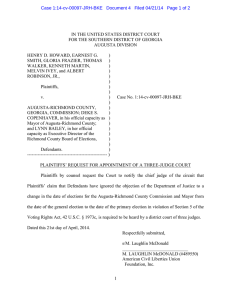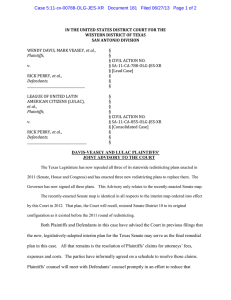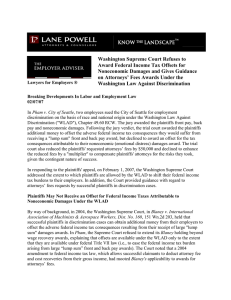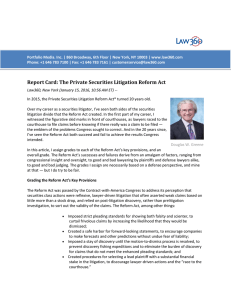Long Term Care & Senior Housing Senior Housing
advertisement
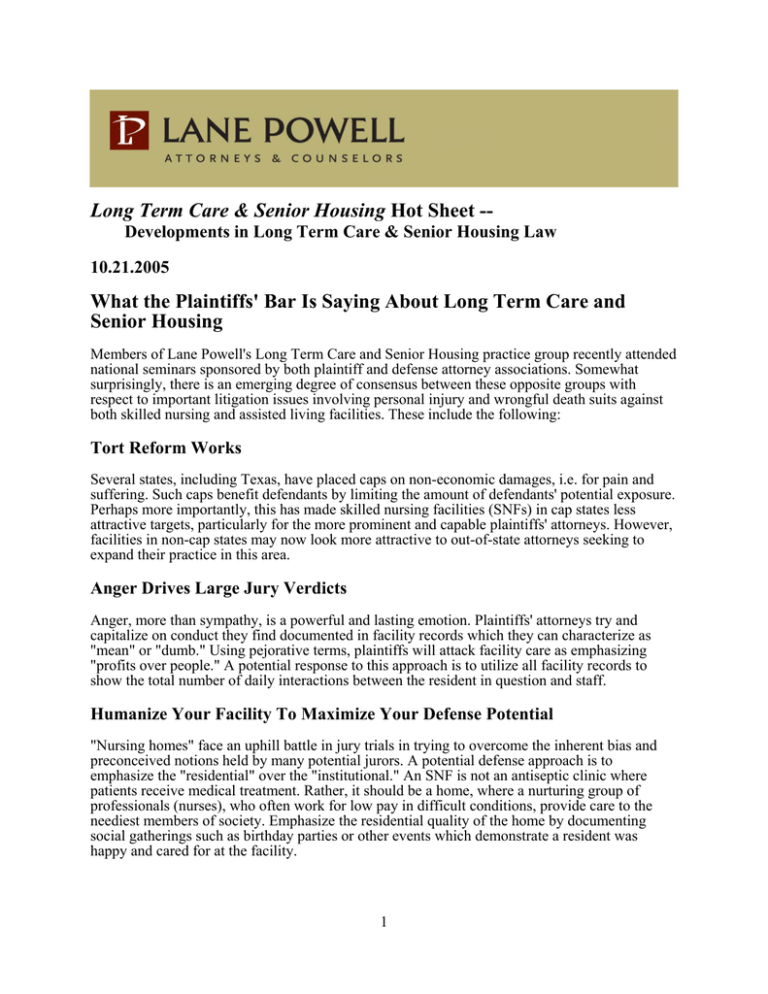
Long Term Care & Senior Housing Hot Sheet -Developments in Long Term Care & Senior Housing Law 10.21.2005 What the Plaintiffs' Bar Is Saying About Long Term Care and Senior Housing Members of Lane Powell's Long Term Care and Senior Housing practice group recently attended national seminars sponsored by both plaintiff and defense attorney associations. Somewhat surprisingly, there is an emerging degree of consensus between these opposite groups with respect to important litigation issues involving personal injury and wrongful death suits against both skilled nursing and assisted living facilities. These include the following: Tort Reform Works Several states, including Texas, have placed caps on non-economic damages, i.e. for pain and suffering. Such caps benefit defendants by limiting the amount of defendants' potential exposure. Perhaps more importantly, this has made skilled nursing facilities (SNFs) in cap states less attractive targets, particularly for the more prominent and capable plaintiffs' attorneys. However, facilities in non-cap states may now look more attractive to out-of-state attorneys seeking to expand their practice in this area. Anger Drives Large Jury Verdicts Anger, more than sympathy, is a powerful and lasting emotion. Plaintiffs' attorneys try and capitalize on conduct they find documented in facility records which they can characterize as "mean" or "dumb." Using pejorative terms, plaintiffs will attack facility care as emphasizing "profits over people." A potential response to this approach is to utilize all facility records to show the total number of daily interactions between the resident in question and staff. Humanize Your Facility To Maximize Your Defense Potential "Nursing homes" face an uphill battle in jury trials in trying to overcome the inherent bias and preconceived notions held by many potential jurors. A potential defense approach is to emphasize the "residential" over the "institutional." An SNF is not an antiseptic clinic where patients receive medical treatment. Rather, it should be a home, where a nurturing group of professionals (nurses), who often work for low pay in difficult conditions, provide care to the neediest members of society. Emphasize the residential quality of the home by documenting social gatherings such as birthday parties or other events which demonstrate a resident was happy and cared for at the facility. 1 Judiciously Consider Conceding Negligence But Not Causation The medicine in senior housing cases often favors the facility due to the frequent presence of comorbidities and the natural aging process. As such, plaintiffs will seek to try the facility rather than the medicine. In some cases, an effective technique may be to admit negligence, i.e., a breach of the standard of care -- but not medical causation. This approach can help the jury focus on an issue which favors the defense and even minimize or eliminate unfavorable evidence regarding a professional failing. In the right case, an admission can also help neutralize jury anger. Think Twice Before "Going Bare" Some facilities do not buy insurance or buy low limits, espousing the theory that this will make them less attractive candidates to personal injury lawyers. This may work in certain instances; however, it can also have serious adverse consequences. Utilizing several theories, plaintiffs are seeking to hold owners personally liable for the potential negligence of their facilities. Such theories include piercing the corporate veil through the failure to respect corporate formalities or through retained control, and direct liability for directing decisions affecting care, such as staffing levels. On a related front, facility owners may want to consider Directors & Officers Liability insurance, which in some instances can pay for defense costs incurred responding to certain governmental investigations and even criminal prosecutions. For more information, please contact the Long Term Care and Senior Housing Law Practice Group at: Lane Powell PC: (206) 223-7000 Seattle (503) 778-2100 Portland (360) 754-6001 Olympia longtermcareandseniorhousing@lanepowell.comwww.lanepowell.com We provide the Long Term Care and Senior Housing Hot Sheet as a service to our clients, colleagues and friends. It is intended to be a source of general information, not an opinion or legal advice on any specific situation, and does not create an attorney-client relationship with our readers. If you would like more information regarding whether we may assist you in any particular matter, please contact one of our lawyers, using care not to provide us any confidential information until we have notified you in writing that there are no conflicts of interest and that we have agreed to represent you on the specific matter that is the subject of your inquiry. © 2005 Lane Powell PC Seattle - Portland - Anchorage - Olympia - London 2

